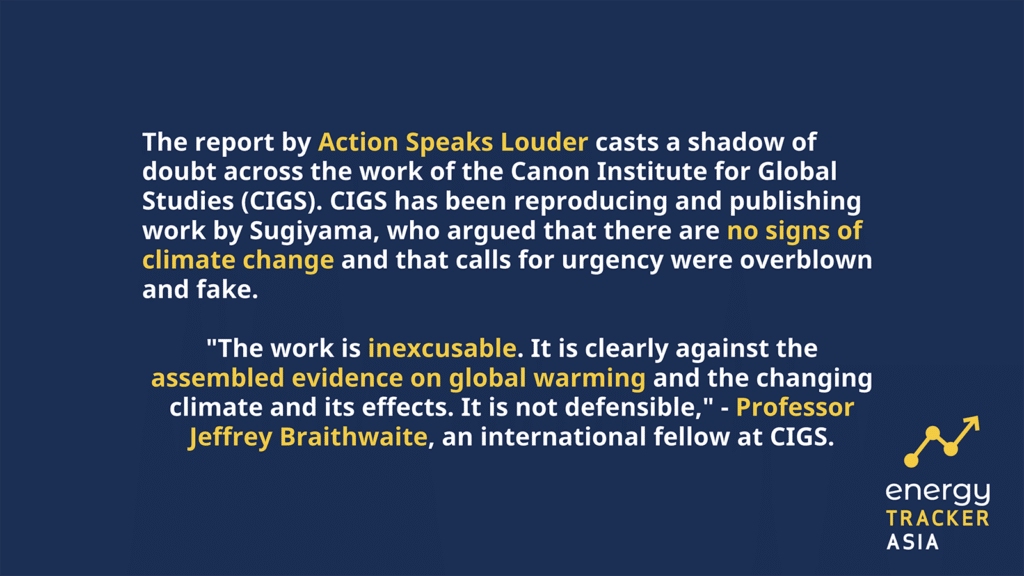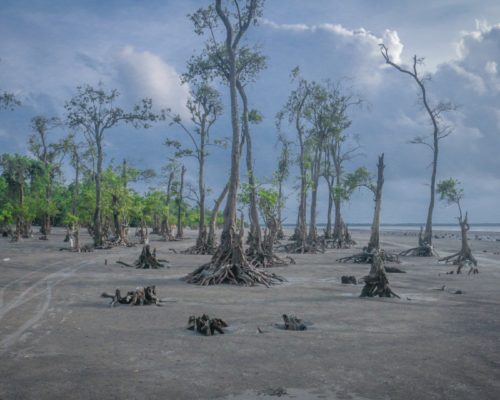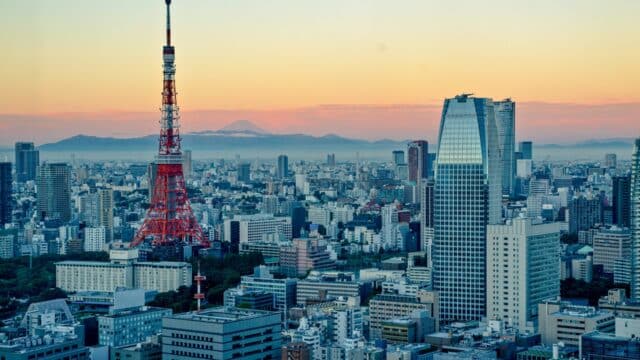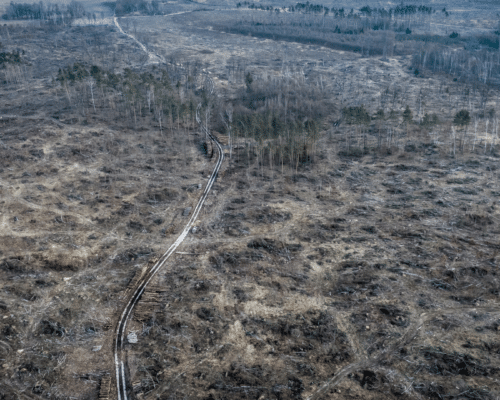Canon Backed Think Tank CIGS Spreads Climate Change Denial
10 March 2022 – by ETA Editorial
Canon is a world-leading camera brand with many users who support climate change, wildlife and conservation. On the surface, Canon also seems to care about these environmental issues by technological innovation and minimising environmental impact across their products and contributing to a low carbon society.
However, this line of corporate green environmental vision speech runs contrary to climate denial materials published and spread by the Canon-funded think tank – the Canon Institute for Global Studies (CIGS). Campaign group Action Speaks Louder recently exposed CIGS for sowing doubt on climate science, spreading misinformation and promoting fossil fuels.
Canon Now Joins Climate Change Denial Think Tank Club
The Canon-funded CIGS now joins a not-so-illustrious group of think tanks involved in climate change denial with links to huge fossil fuel interests. These include institutions like the American Enterprise Institute, the Cato Institute, the Heartland Institute, and George C. Marshall Institute. Each plays a part in downplaying or denying climate change science, eliminating hazardous substances and slowing the energy transition towards clean, renewable energy.
Canon’s and CIGS’ Climate Change Misinformation
The report by Action Speaks Louder casts a shadow of doubt across the work of the CIGS. The think tank was founded in 2008 on Canon’s 70th anniversary to promote research based on Canon’s corporate philosophy – kyosei – the notion of living and working together for the common good. However, CIGS’ and Dr Taishi Sugiyama’s work on climate change represents the opposite.
Dr Sugiyama Declared Climate Change as “Liberal Propaganda”
At the centre of the debacle is Dr Sugiyama, a research director at CIGS, who has described climate change as “fake news” and “liberal propaganda”. CIGS has been reproducing and publishing work by Sugiyama, who argued that there are no signs of climate change and that calls for urgency were overblown and fake. He went as far as stating that “such things do not exist anywhere”.
Instead, Sugiyama argues that the urban heat island effect is responsible for climate change rather than carbon footprint and carbon emissions. According to him, this is due to too much concrete radiating heat and a lack of green space in cities—an inaccurate and misleading claim.
Books about Climate Change and Sustainable Development Goals
The controversy also extends into Sugiyama’s books. This year, he published a children’s book – Global Warming from the Age of 15: Facts Not Taught in School. The book encourages Japanese children to doubt climate change science and environmental sustainability. Previously, he authored another book called “The Inconvenient Truth of the SDGs: The Big Lie About Decarbonisation Saving the World”. Both his books are promoted on CIGS’ website.
Additionally, Sugiyama has links with recommending reports translated into Japanese from other thinktanks known for hostility toward climate science, sustainable society, net-zero policies and renewable energy. One report, recommended by him, denounced the benefits of keeping global temperature rise at 1.5 degrees Celcius.
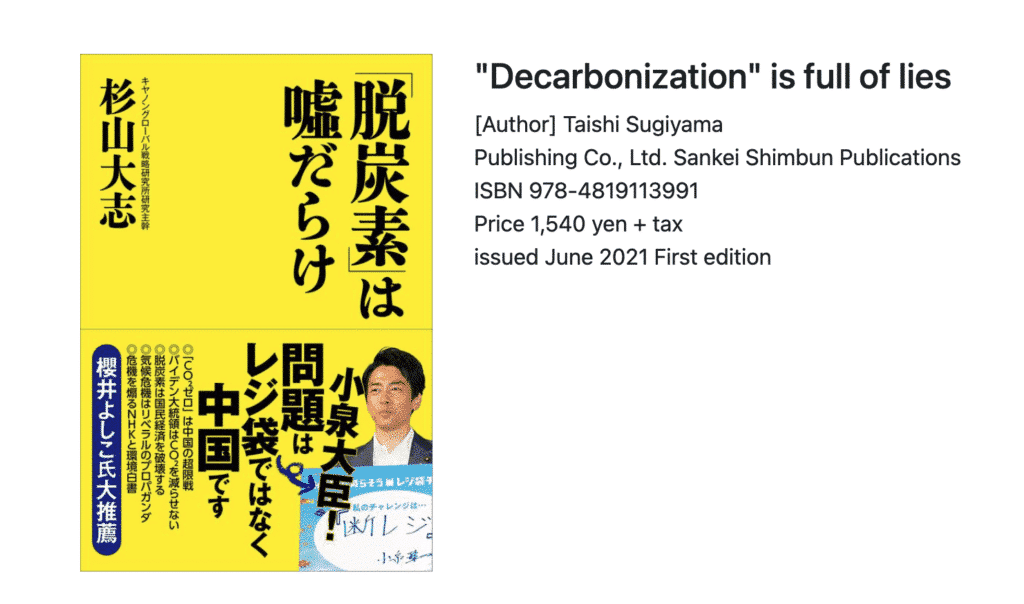
Links with the IPCC
Adding fuel to the fire, peppered with confusion, Sugiyama has been a lead author on multiple IPCC reports. This includes the latest climate change report released on impacts, adaptation and vulnerability.
Splits within Canon Institute for Global Studies and Outside
The exposé of Sugiyama’s work and Canon’s climate change links with CIGS has inspired ire from colleagues within CIGS. Professor Jeffrey Braithwaite, an international fellow at CIGS, told The Guardian that the work is inexcusable. “It is clearly against the assembled evidence on global warming and the changing climate and its effects. It is not defensible,” said Braithwaite. He added that Sugiyama’s work did not sit well with him as a scientist promoting science and evidence on climate change.
Japanese climate scientist, Dr Seita Emori, likened Sugiyama’s work to the typical strategies used by other climate denialists and sceptics.
CIGS and the Risks to Canon’s Reputation
Like many other companies, Canon aims to achieve net-zero emissions by 2050. For example, Canon’s sustainability report says it will begin by accounting for the environmental impacts of its entire product lifecycle. However, climate goals are one thing; supporting climate denial and scepticism is another.
Through its work with CIGS and association with Sugiyama, Canon risks its reputation amongst many loyal brand users who care about science, climate change and the natural world. Consequently, this extends into the business world too, where more and more companies recognise the importance of climate change and climate science.
The authors of the report, Action Speaks Louder, call for more accountability from Canon regarding the views of their researchers. They added that Canon must stop supporting materials sowing doubt on climate change. The connections to CIGS and Sugiyama must go to take Canon’s net-zero claims seriously.
Further reading of the Action Speaks Louder report and petition page can be found here.
